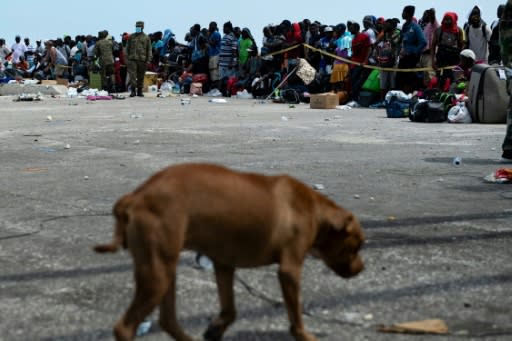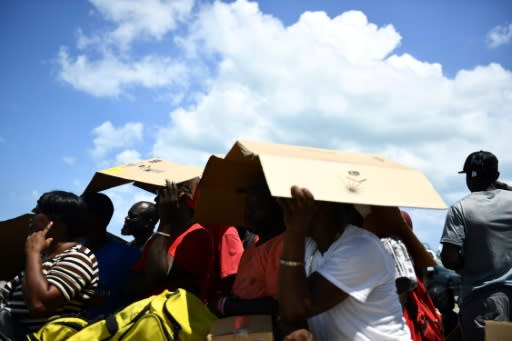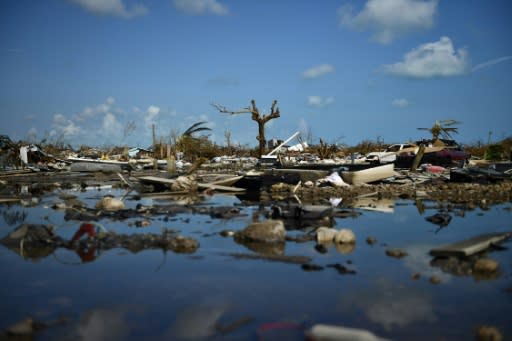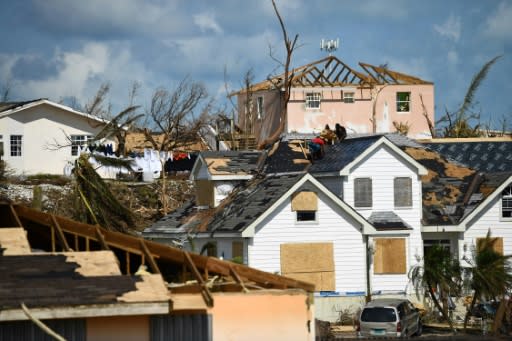For Bahamas island's new homeless, a grim wait for evacuation
"Here, we're all going to die." Miralda Smith spoke in a nervous near-whisper as she lined up Saturday with hundreds of other weary, shell-shocked residents of devastated Marsh Harbour to leave the Abaco Islands in the Bahamas. Smith, a Haitian national, had arrived on foot at 4:00 am (0800 GMT) after the shantytown where she and many other Haitian workers lived -- The Mudd -- was almost completely wiped out by Hurricane Dorian. On Saturday, as Smith awaited passage to Nassau -- where her Bahamian husband lives -- she reflected on the grim events of the past week. "I just want to leave the island," she said, speaking in French. "We have no water, no electricity -- we're dying. It's really catastrophic." - Seeking relief - By midday, hundreds of people were lined up at the port, sitting on bags or on the ground, some seeking relief from the baking sun with scraps of cardboard or salvaged plastic. The line stretched from a hangar -- the roof of which had been ripped off by Dorian's Category 5 winds -- to the dock, where soldiers inspected people's baggage before it was stacked onto pallets and wrapped in plastic for loading on ships. As the wait stretched out, food and water were regularly handed out. One ferry left early Saturday for the capital Nassau with 200 evacuees; another was to leave during the afternoon. Private boats and even big cruise liners were arriving to help in the evacuation. - 'Dead bodies everywhere' - Sixty-one-year-old Ilfraed Othello stared grimly at the remains of his home in the distance. "I don't want to walk that way, there are dead bodies everywhere," he said. He took refuge in a neighbor's home during the storm, escaping only with his passport and Bible, he said. "I want to leave by boat or by plane," Othello said. "There's no sense in staying here." Chaos also prevailed at the airport in the southern part of the city. Perhaps 100 people were lined up waiting for flights out on the national airline. Some slept on the ground or in chairs while children played. A hundred more waited to get into the terminal. "We gonna put everybody off this island," an airport worker assured everyone, "but we have to work together. It's gonna be all right." - 'No food, no water' - Tanya McDermott had been waiting for hours with her husband and son, but with priority going to the injured and the elderly, as well as single mothers with children, their wait stretched out. "We are going to wait around all day if we have to," she said. Another would-be evacuee, Chamika Durosier, described the desperate scenes facing those still on the island. She and her family had to crawl out of their home after the roof fell in, Durosier said, and now they just wanted to get away. "People have no food. People have no water, and it's not right," she said. "Dead bodies are still around and it's not sanitary." The airport's runway was still usable but several airport buildings were damaged or destroyed. Uprooted palm trees blocked parts of the parking lot. But not everyone wanted to leave. Kelly Louis-Pierre, a 54-year-old mason, survived the storm relatively unscathed in his concrete home -- across the street from The Mudd. With his wife and seven children, he is determined to stay and rebuild. "After the hurricane we need work, jobs -- start over again from scratch," he said. "I have a house to live in and we have to rebuild this area." As for The Mudd, he thinks it should be razed. Developers might then be willing to invest in the area, he said, adding, "They could build whatever they want." People await evacuation at a dock in devastated Marsh Harbour, Bahamas, on September 7, 2019, in the aftermath of Hurricane Dorian People seek shelter from the sun as they await evacuation at a dock in Marsh Harbour, Bahamas, on September 7, 2019, in the aftermath of Hurricane Dorian Belongings litter the ground amid the devastated remains of the shantytown known as The Mudd in Marsh Harbour, the Bahamas, on September 7, 2019 While some were fleeing the island, these residents were repairing a roof in the devastated neighborhood known as The Mudd in Marsh Harbour on September 7, 2019





